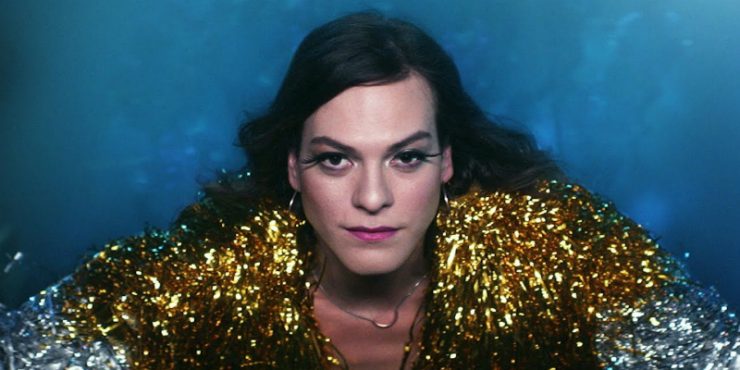At one point, near the middle of Sebastián Lelio’s latest film, A Fantastic Woman, the film’s main character, Marina Vidal, is referred to, pejoratively, as a chimera. She does not react to the odd specificity of this strangely academic attempt at name-calling (I must confess – I had to look up what it was), nor does she recreate the ferocity that a hybrid monster like a chimera would wreak. She does not break into tears, or righteously take the high road. What I saw on her face was recognition, an instant understanding of the kind of person standing in front of her. You see, Marina Vidal is a transgender woman. She is quite familiar with people comparing her to monstrosities; she’s had a lifetime of practice.
Marina is played by transgender actress Daniela Vega. It’s a fabulous piece of acting filled with moments like the one mentioned above. Often, Marina is forced to accept the oppression that comes with her gender fluidity and society’s obsession with her genitalia. For a moment, Marina had thought she’d found peace and love with an older man named Orlando (Francisco Reyes). He visits her at the club she sings at, and invites her to move into his nice apartment. He has given up a wife and family to be with her, and that passion and commitment gives Marina a purpose that finally helps her forget outside hostility she is met with daily. But when Orlando has a sudden, unforeseen death, Marina is suddenly brought back to square one with a whole new cast of people ready to find her unwelcome.
It comes from a son, Bruno (Nicolás Saavedra), who’s anger seems to extend beyond grief and dismay at his father’s choice of lovers. It comes from a police detective, Antonia (Amparo Noguera), who presumes foul play in Orlando’s death, forcing Marina to have to repeatedly defend their normal, consensual adult relationship. It mostly comes from an ex-wife named Sonia (Aline Küppenheim), whose indignation stems from intolerance, but also from a bafflement that a husband could leave her for Marina. Sonia channels that hurt into cruelty, and she aims it at Marina. Marina is told she is banned from the funeral and the wake, that she is not to be seen by Sonia’s young children. She is told that she is a “perversion”.
A Fantastic Woman isn’t all gloomy victimization. Marina has a few allies, including Orlando’s brother, Gabo (Luis Gnecco), who meekly tries to play peacemaker but never truly has the backbone to stand up to Sonia and Bruno. She also has a sister, Wanda (Trinidad González), willing to give her a place to stay once Sonia and the family pressure her to leave Orlando’s apartment. Lelio’s script (written by him and Gonzalo Maza) is best when it focuses on Marina and not her misfortune. The film is smart to note that most of her pain comes from her grief at Orlando’s death than from his family’s disdain for her. Lelio’s 2013 film, Gloria, was also a story about a woman trying to overcome what society thinks of her. Lelio’s gift for bringing truth and beauty from these characters is stunning.
Vega’s performance is a remarkable debut. It’s everything that is great about screen acting: vulnerable, alluring, heartbreaking, funny. Lelio guidance is key, but Vega herself gives this character so much dimension, so much pain. A Fantastic Woman can be a very serious film at times, and I think that is where it occasionally stumbles – this is not a Boys Don’t Cry level oppression study. Lelio is a much better study of people than he is of causes. With Vega, he crafts one of the best character studies of the year.
Directed by Sebatián Lelio










